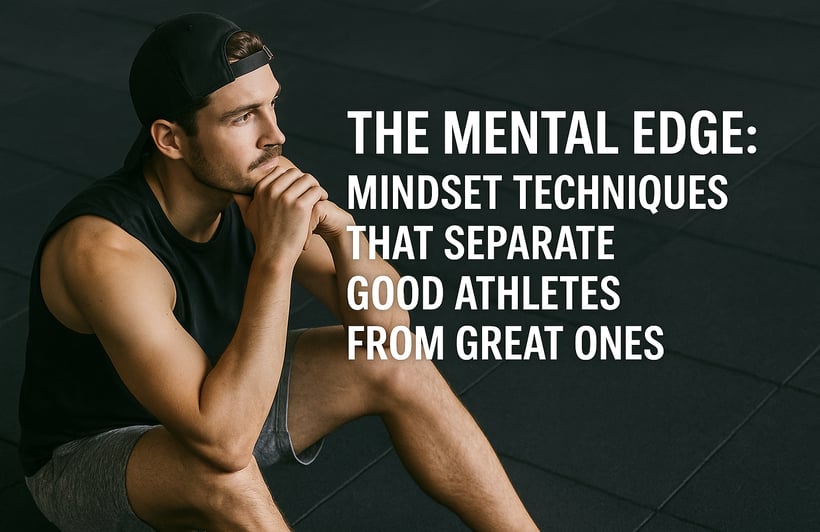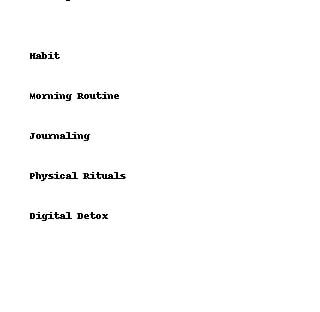The Mental Edge: Mindset Techniques Used by Elite Athletes
Unlock peak performance with mindset strategies used by top athletes. Learn visualization drills, mindfulness tools, self-talk scripts, and daily habits to boost focus, resilience, and results—plus recommended gear to train your mental game.
5/24/20253 min read


The Mental Edge: Mindset Techniques That Separate Good Athletes from Great Ones
Elite athletic performance isn’t just about speed, strength, or skill—it’s about what’s inside the athlete’s mind. Developing mental mastery can be the difference between streaming highlights and staying on sidelines. Here's how visualization, mindfulness, self-talk, and everyday habits form the mindset foundation of champions.
1. Go Pro with Visualization
Visualization—mentally rehearsing success before it happens—is a powerful tool used by top athletes. Tennis legend Andre Agassi famously visualized every point, anticipating opponent’s moves and his own shot. Studies show mental imagery activates the same neural networks as physical execution, strengthening “muscle memory” without fatigue.
How to practice visualization:
Find a quiet space and close your eyes.
Slowly reconstruct a perfect performance: see every movement, feel the tension in your muscles, hear the crowd or your breathing.
Engage all senses—smell the field, feel the ground, sense momentum.
Repeat daily, ideally before training or competition.
PositivePsychology.comWikipedia
Product we recommend: Sport Visualization for the Elite Athlete
Enhance your imagery game with this focused workbook tailored for athletes:
Sport Visualization for the Elite Athlete by Bill Bodri
Teaches how to build and refine mental imagery drills
Includes exercises to strengthen clarity, detail, and emotional engagement
Ideal for athletes across levels looking to make visualization systematic Amazon
2. Build Resilience with Mindfulness
Mindfulness—paying attention, on purpose, in the present moment—helps athletes stay calm under pressure, learn from setbacks, and prevent burnout. It’s practiced by pros like Phil Jackson, who integrated meditation into NBA teams’ routines. Jon Kabat‑Zinn’s MBSR programs show meditation lowers stress hormones, improves focus, and boosts emotional regulation WikipediaWikipedia.
Quick mindfulness drill:
Set a 5‑minute timer.
Sit comfortably and focus on your breath.
When thoughts intrude, observe them and gently return to inhalation.
End by scanning your body with curiosity, noticing tension or ease.
Product we recommend: The Mindful Athlete
Deepen your mental training with this pro-level resource:
The Mindful Athlete: Secrets to Pure Performance by George Mumford
Blends mindfulness with stories from NBA stars and coaches
Practical exercises for staying in the moment during training and competition
Great for developing poise and minimizing distractions Amazon
3. Strengthen with Self‑Talk Scripts
Words shape reality. In playoff pressure or crunch time, your inner dialogue determines whether you feel capable—or crushed. Elite performers use preset self-talk scripts to stay grounded and focused.
Examples:
Pre-event: “I have trained for this. I am ready.”
During competition: “Stay calm. One breath at a time.”
After a mistake: “Mistakes are part of growth. Next play is mine.”
Post-game: “I gave my best. I’ll learn and get better tomorrow.”
Daily repetition turns these into automatic mental anchors under stress.
4. Adopt Winning Habits
Legendary coaches like Tim Grover (Jordan, Kobe) focus on routines just as much as strategy. These habits reinforce mental toughness and prepare the brain for peak performance:
These repeatable rituals help minimize distractions, maintain consistency, and manage performance anxiety.
5. Mental Health & Peak Performance
Mindset work doesn’t just improve results—it protects mental health. Burnout, anxiety, and depression are widespread among athletes. Integrating mental strategies like mindfulness and self-talk helps athletes:
Manage stress and pressure
Improve sleep and recovery
Sharpen attention and adaptability
Build emotional resilience
As Brad Stulberg & Steve Magness note in Peak Performance, the trick isn't pushing harder—but knowing how to recharge and sustain focus PositivePsychology.com.
Putting It All Together: Daily Mindset Training Routine
Morning (5–10 min)
Mindful breathing + 1 self-talk affirmation + vivid visualization of the day ahead
Pre-training
Recite: “I am prepared. I embrace the challenge.”
During Activity
Mini check-ins: “Calm. Strong. One play at a time.”
Post-training / Night
Journal: “Today I learned… Tomorrow I improve.”
Optional: 5-minute mindfulness wind-down before bed
Practice this routine consistently to transfer mental skills into automatic performance habits.
Final Takeaway
Great athleticism is forged in the body—but refined in the mind. By weaving together visualization, mindfulness, targeted self-talk, and structured habits, you build the kind of durable mindset elite pros rely on. These tools don't just win games—they shape lives, boost resilience, and protect mental health along the way.
If you're ready to elevate your mental game, check out the toolbox items above—or dive deeper with Pro tools and books like Sport Visualization, The Mindful Athlete, or The Inner Game of Tennis. Your mental edge starts in the mind—and it can change everything.


FITNESS
Nutrition
WellnesS
info@movebetterco.com
© 2025. All rights reserved | Privacy Policy | Terms & Conditions